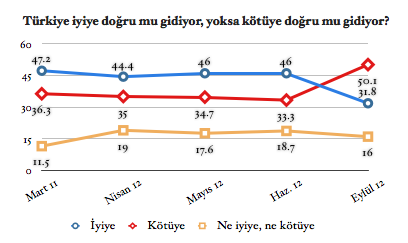Recently, a Turkish public opinion survey, conducted by MetroPoll was published, showing important shifts in the public perception of the government and politics. Conducted through 14-19 September 2012, in 27 cities, surveying 1275 respondents, the poll indicates serious shifts in public perception in the last three months.

Figure from MetroPoll survey – blue line indicates belief in Turkey heading towards the right direction – http://www.metropoll.com.tr/report/turkiye-siyasal-durum-arastirmasi-eylul-2012
Those who believe ”Turkey is headed towards the right direction” are beginning to change their views. While in June 46% of the respondents were happy with the direction country is headed, this figure is not 32.8% in September findings. More importantly, the spill-over of the Arab Spring spirit into Syria and the civil-war that followed, Turkey’s decision to support the opposition Free Syrian Army (FSA), the Iranian retaliation by supporting the Kurdistan Workers Party (PKK), thereby creating a new Kurdish insurgency period and the subsequent increase in Turkish military losses, all seem to contribute to a general sense of insecurity: 54.9% of the respondents have claimed that they feel “less secure compared to last year.”
With regard to Turkey’s Presidency questions, the report yields interesting results. 2014 is a critical year as it will witness both general elections and the end of current President Abdullah Gül’s tenure. It will be the first time that a President will be elected through direct public vote instead of parliamentary plebiscite. It is known that Prime Minister Recep Tayyip Erdogan sees Presidency as his ultimate goal; it is also known that he wishes to create an executive Presidency similar to that in the United States. Simultaneous with the shift in the Presidential system, Erdogan made his interest in the position explicit, leading to a dormant cold war with his once comrade-in-arms Abdullah Gul. While Erdogan will do all he can to climb at the top of the Turkish state, with or without a switch towards executive Presidency, current President Gul is aware of and uncomfortable with the politics of polarization employed by PM Erdogan — and thus, believes that the Presidency should be given to a more patient, careful and peaceful candidate. President Gul himself can also nominate himself in the Presidential elections and get a second re-election. The poll gives out the key statistic on the issue; 50.9% of the respondents have indicated that they favor Abdullah Gul’s re-election, instead of PM Erdogan, who could muster only 22.7% of the votes.
Regarding the Syrian crisis, the poll indicates serious mistrust towards the government’s handling of the Syrian crisis. Whilte 28.1% of the respondents support AKP’s Syrian policy, 56% of them assert that they are “unhappy” with how the government deals with Syria. There is a clear public opinion against Turkey’s unilateral military involvement in Syria (76% against), while interestingly, the idea of going to war in Syria ‘together with NATO’ brings down that figure – albeit still high – to 58%.
While Turks don’t want him to assume Presidency, Recep Tayyip Erdogan is still undisputedly the ”most trusted” leader, who got 41% in the poll, as well as the ”most favored” one (34.2%), followed by the main opposition leader Kemal Kılıçdaroğlu (8%).